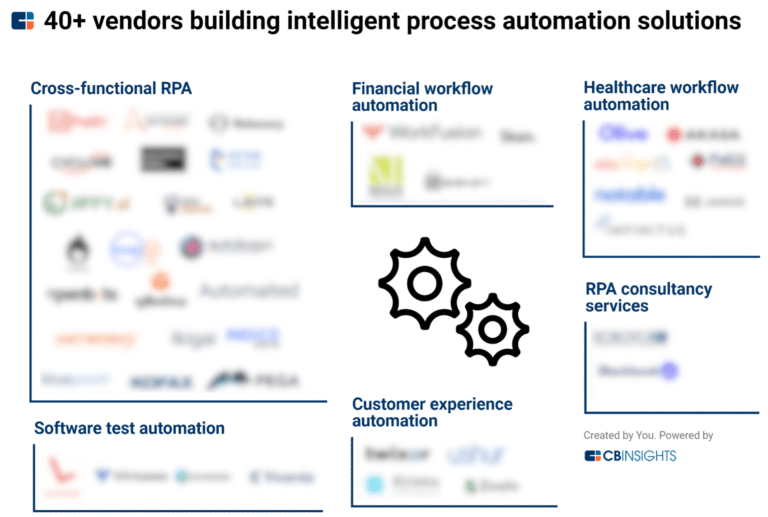
Ushur
Founded Year
2014Stage
Series D | AliveTotal Raised
$107MLast Raised
$15M | 2 mos agoMosaic Score The Mosaic Score is an algorithm that measures the overall financial health and market potential of private companies.
-51 points in the past 30 days
About Ushur
Ushur focuses on Customer Experience Automation within the technology sector. The company offers a platform designed to automate customer journeys and provide engagement and issue resolution. Its solutions are utilized by organizations in industries such as healthcare, insurance, and financial services. It was founded in 2014 and is based in Santa Clara, California.
Loading...
Ushur's Product Videos
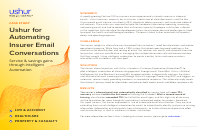
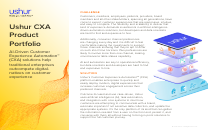
ESPs containing Ushur
The ESP matrix leverages data and analyst insight to identify and rank leading companies in a given technology landscape.
The insurance customer communication market enables insurance companies to automate and improve communication with policyholders. The market is characterized by the use of smart SMS platforms, mobile apps, self-service portals, and AI-enabled chatbots. Many companies in this space offer third-party integrations with other tech vendors. These solutions can help insurance companies reduce customer s…
Ushur named as Leader among 13 other companies, including Twilio, Hi Marley, and FICO.
Ushur's Products & Differentiators
Conversational Apps
Conversational Apps enables enterprises to power asynchronous conversations through SMS, web, email, messaging apps and more to automate two-way engagements and self-service tasks. Healthcare companies use Conversational Apps to collect and share information related to service requests, appointments, care services, surveys, and more. By automating conversations through asynchronous, self-service channels, customers communicate at their convenience - when and where they prefer - while enterprises accelerate speed to resolution and save man hours for inbound/outbound support.
Loading...
Research containing Ushur
Get data-driven expert analysis from the CB Insights Intelligence Unit.
CB Insights Intelligence Analysts have mentioned Ushur in 4 CB Insights research briefs, most recently on Dec 18, 2023.
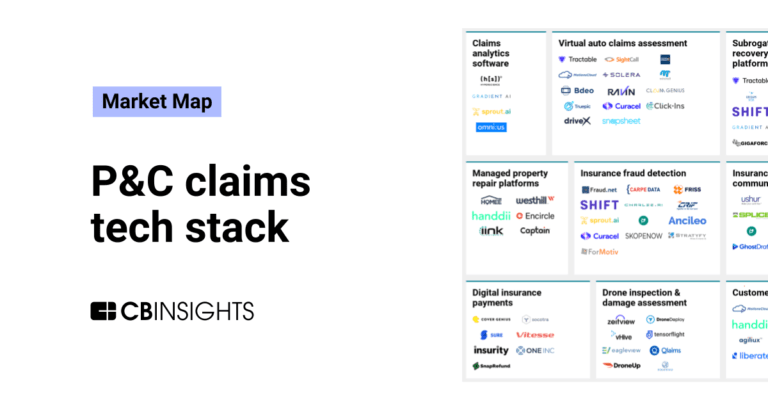
Dec 18, 2023
The P&C claims tech stack market map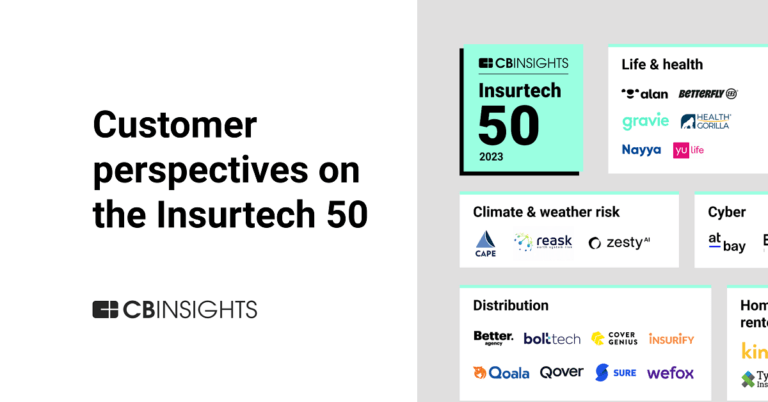
Aug 1, 2023
Customer perspectives on the Insurtech 50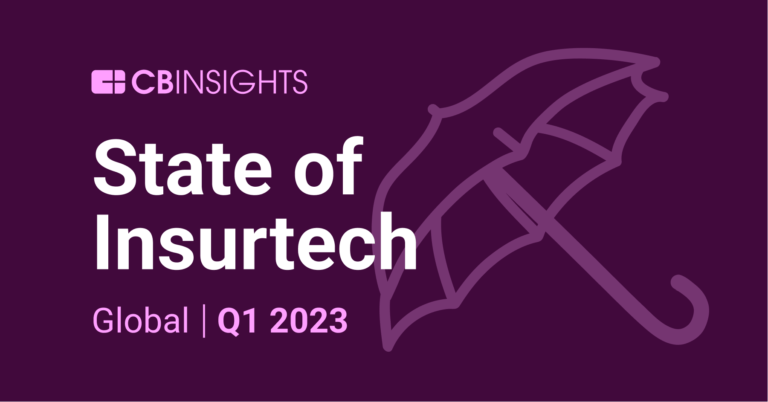
May 9, 2023 report
State of Insurtech Q1’23 ReportExpert Collections containing Ushur
Expert Collections are analyst-curated lists that highlight the companies you need to know in the most important technology spaces.
Ushur is included in 7 Expert Collections, including Robotic Process Automation.
Robotic Process Automation
322 items
RPA refers to the software-enabled automation of data-intensive tasks that are low-skill but highly sensitive operationally, including data entry, transaction processing, and compliance.
Insurtech
4,489 items
Companies and startups that use technology to improve core and ancillary insurance operations. Companies in this collection are creating new product architectures, improving underwriting models, accelerating claims and creating a better customer experience
Fintech
9,451 items
Companies and startups in this collection provide technology to streamline, improve, and transform financial services, products, and operations for individuals and businesses.
Sales & Customer Service Tech
600 items
Companies offering technology-driven solutions to enable, facilitate, and improve customer service across industries. This includes solutions pre-, during, and post-purchase of goods and services.
Insurtech 50
50 items
ITC Vegas 2024 - Exhibitors and Sponsors
699 items
Created 9/9/24. Updated 10.22.24. Company list source: ITC Vegas. Check ITC Vegas' website for final list: https://events.clarionevents.com/InsureTech2024/Public/EventMap.aspx?shMode=E&ID=84001
Ushur Patents
Ushur has filed 11 patents.
The 3 most popular patent topics include:
- data management
- artificial intelligence
- computational linguistics

Application Date | Grant Date | Title | Related Topics | Status |
|---|---|---|---|---|
8/18/2021 | 9/26/2023 | Natural language processing, Computational linguistics, Data management, Artificial intelligence, Semantic Web | Grant |
Application Date | 8/18/2021 |
|---|---|
Grant Date | 9/26/2023 |
Title | |
Related Topics | Natural language processing, Computational linguistics, Data management, Artificial intelligence, Semantic Web |
Status | Grant |
Latest Ushur News
Mar 9, 2025
MedCity News Inside Healthcare’s Hottest New AI Category: Agentic AI Healthcare organizations are starting to implement AI agents — autonomous, task-specific systems designed to perform functions with little or no human intervention. While initial adoption is focused mainly on non-clinical areas like scheduling and prior authorizations, experts predict that AI agents could eventually play a role in clinical decision-making, provided they meet rigorous safety and reliability standards. By Katie Adams on March 09, 2025 Share Copy LinkCopy Link The use of AI in healthcare has evolved quite a bit over the past few years — with many healthcare organizations transitioning from a state of cautious experimentation to more serious attempts at scaled integration . As millions of venture capital dollars continue to flow to startups developing healthcare AI, it’s clear that organizations across the industry will be leveraging this technology to optimize workflows and improve patient outcomes for years to come. As this trend continues, healthcare leaders are becoming increasingly interested in the category of agentic AI. Experts predict that AI agents — autonomous, task-specific systems designed to perform functions with little or no human intervention — will likely become increasingly popular in healthcare over the next couple years. The industry is facing growing pressures to achieve cost containment without compromising care quality, and health tech experts believe AI agents are a scalable solution that can help with this arduous goal. In Soni’s view, AI agents are simply building on the foundation of all the AI models that came before — combining predictive capabilities with actions and data to perform tasks. These tools are dubbed “agents” because they mimic human-like assistance, he explained. He noted that healthcare can benefit greatly from AI agents, as the field is rife with inefficient workflows. “Agentic AI works best when the user is incredibly sophisticated, when the workflows that you’re making better are incredibly repeatable, and when the ontology and knowledge that’s required is fixed. In those situations, AI actually is very effective,” Soni stated, adding that healthcare checks all those boxes. He said that AI agents should be assistive and invisible, with the main goal of allowing clinicians to focus more on patient care. How can providers deploy AI agents? Soni said that agentic AI will see widespread adoption first for back-end, administrative use cases. When it comes to AI in the healthcare sector, this is always the first step, he noted. Some use cases include autonomous prior authorization requests and call center agents. Another healthcare expert — Naimish Patel, head of healthcare at Red Cell Partners , an investment and incubation firm — agreed with Soni. He also said healthcare organizations will begin by deploying AI agents in non-clinical use cases, with clinical applications to follow. In Patel’s view, AI agents focused on the patient journey will see the greatest adoption. For example, there are agentic AI models that can autonomously schedule appointments and check in with patients to see if they’re following their care plan at home, he explained. “That’s a pretty low-stakes use case, but there are lots of areas where AI can greatly improve that process. Think about the specific preferences certain providers have — you may have three dermatologists, but one of those dermatologists may not perform certain procedures. Knowing which dermatologist performs which procedure and looking for availability are all multiple steps that a person would be doing — but now the AI can do it almost instantaneously,” Patel declared. InTrivo is an example of a company selling agentic AI tools to complete the tasks Patel described for patients, as well as help them schedule appointments. AI agents can also take over some basic tasks for busy healthcare staff — which is key given the sector’s ongoing workforce shortage. Agentic AI can help alleviate the labor shortage by automating repetitive tasks, therefore allowing clinicians to focus on practicing at the top of their licenses. For instance, AI agents can make calls on behalf of nurses and send text messages to patients to remind them to pick up their medication or gather information about their recovery, Patel pointed out. Some examples of companies selling agentic AI for these use cases include Notable , Luma Health and Hyro . One agentic AI company — VoiceCare AI — has developed an agent specifically for providers’ revenue cycle management teams. The startup’s agent, named Joy, makes its own business-to-business calls, for things like insurance verification, prior authorization, claims processing and appeals. Mayo Clinic is currently using the tool. Joy is making calls on Mayo’s behalf and then providing the health system with summaries of the outcomes, explained VoiceCare AI CEO Parag Jhaveri. “Let’s say we wanted to get a prior auth approval for a particular surgery or treatment. Joy can call the insurance company to ask if there is a prior auth on file or not. If there is not, she can initiate a prior auth — and she can follow up with the prior auth when it is approved to get the prior auth approval number and the reference ID. The patient can be seen by the doctor, and every conversation is recorded on the cloud,” he said. Automating these phone calls end-to-end eliminates a “tremendous” amount of tedious work, Jhaveri pointed out. He said he was recently on a call with leaders from another large health system who told him their imaging department makes 70,000 calls to insurers per month. “They were saying, ‘Hey, can we free up these people to do other things?’ It’s slowly manifesting into becoming a reality as we speak,” Jhaveri declared. He said this tool usually costs between $4.02 and $4.49 per hour on a consumption-based pricing model. Providers with higher call volumes pay a rate closer to the less expensive side of this range, and providers with lower call volumes pay a rate toward the more expensive side. Jhaveri mentioned that VoiceCare also has an outcomes-based model, meaning providers have to pay only if the agent successfully delivers results. For providers opting for this pricing model, the agent costs between $4.99 and $5.99 per hour. How can payers deploy AI agents? Payers can also leverage agentic AI to improve member satisfaction. For instance, automation company Ushur released a new health plan-focused AI agent this week. Ushur CEO Simha Sadasiva said he began his company because of the experience he had as the primary caregiver for his terminally ill mother. Every couple of weeks, he would spend hours on the phone with her health plan, often on hold and waiting to be transferred. Ushur’s agent enables payers to automate member requests that would typically require human intervention at call centers. Unlike traditional chatbots that simply provide scripted answers to frequently asked questions, Ushur’s agentic AI can process and fulfill service requests, such as issuing a member ID card or scheduling a procedure — eliminating the need for human call center agents to manually perform these routine tasks, Sadasiva said. As of 2023, the average annual cost of operating a healthcare call center is nearly $14 million . “For example, a member may need their member ID card. Rather than sending that request to another worker and then waiting for somebody to actually make sure that member ID card is shipped out to the end customer, we can now take that entire workflow, digitize it, and offer that member ID card through a digital channel that can now be in your wallet on your phone. That’s an example of getting access to service requests in a jiffy — in a matter of a few seconds — as opposed to the hoops that end customers have to navigate,” he explained. In just two months, Ushur’s AI agent resolved over 36,000 interactions autonomously for one of its health plan customers, Sadasiva noted. He pointed out that this member adoption occurred organically, with members discovering the tool through self-service options on the health plan’s website. How do AI agents generate value? Another healthcare technology expert — Kimberly Powell, vice president and general manager of healthcare at Nvidia — argued that AI agents can save providers time and money, while also enhancing the patient experience. Nvidia is developing an AI enterprise platform to create task-specific AI agents, she noted. For example, the company recently created a preoperative agent for The Ottawa Hospital to provide patients with 24/7 access to reliable information about their surgeries. Nvidia developed this AI-powered digital avatar to help answer patients’ questions about things like anesthesia, how to get ready for the procedure and recovery, Powell said. The agent increases patients’ preparedness and reduces their pre-procedure anxiety by offering continuous access to information, as well as alleviates the burden on hospital staff, she remarked. “Pre-op appointments can take up to two hours, and these are conducted with a healthcare professional. But a lot of [the information shared during these appointments] — where to park, when to arrive — is not diagnostic or clinical information. But the patient needs to know it so they can adhere to the right instructions — so they can be there on time, and so they don’t have to cancel the surgery because they had any food that morning,” Powell stated. The Ottawa Hospital sees Nvidia’s agent as a way to address its workforce shortages while also improving patient experiences, she added. She pointed out that The Ottawa Hospital conducts about 80,000 surgeries a year. In the past, each surgery required a pre-operative appointment lasting about two hours, she said. “That’s 160,000 hours of preoperative appointments with healthcare staff. What if you could shrink each one of those appointments down by 50%? Then you’ve essentially given back to The Ottawa Hospital 80,000 hours of healthcare staff time,” Powell declared. She also noted that patients are satisfied with Nvidia’s agent. Patients can ask the agent as many questions as they want — and people don’t always feel like they can do that with their provider, Powell noted. With an AI agent, patients don’t have to worry about feeling judged or getting a rushed answer, she added. The typical cost per use case when building out these digital teammates is between $500,000 and $1 million, according to a Nvidia spokesperson. How might AI agent adoption evolve? Soni of Suki envisions a bright future when it comes to expanding the use cases for agentic AI in the healthcare realm. Beyond administrative workflows, AI agents could play a key part in keeping patients in the loop about their health, he noted. “At some point, all the administrative activities will help clinicians teach the AI enough that it can potentially start helping them connect to patients,” he declared. For example, AI agents may be able to instantly provide patients with after-visit summaries or answers to their questions in the EHR, Soni said. He also pointed out that agentic AI could someday help physicians make clinical decisions. “At some point, [AI agents] will get enough information that they can start helping doctors with clinical acumen,” Soni stated. If this prediction becomes a reality, it won’t be anytime soon, he noted. An AI expert from a health system — Jeff Jones, senior vice president of product development at UPMC Enterprises — said that for agentic AI to play a real role in clinical decision-making, it must be rigorously tested and proven. Otherwise, patients won’t be comfortable with their providers using it. “Trust begins with proof. AI tools need to be accurate, reliable and safe before they can support a physician’s choices. Nearly as important, they must integrate seamlessly into clinical workflows, delivering meaningful insights at the right time without disrupting care delivery,” Jones stated. Ensuring that future generations of agentic AI are both effective and responsible will require close collaboration between health systems and technology partners. Solutions like UPMC Enterprises’ Ahavi platform, which was released last month, allows hospitals to test AI tools on de-identified patient data before they are ever deployed on real-world patients, he pointed out. Another health system AI expert — Zafar Chaudry, chief digital officer and chief AI and information officer at Seattle Children’s — noted that realizing agentic AI’s potential in clinical decision-making “requires substantial progress.” “This includes developing AI models with verifiable, transparent reasoning, conducting extensive clinical trials to ensure safety and accuracy, and establishing clear legal and ethical standards for its deployment,” Chaudry said. What might the future hold? Powell of Nvidia pointed out another exciting use case she thinks may gain popularity: disaster relief agents. She mentioned that Hippocratic AI has already created disaster relief agents to check in with patients and provide information during situations like wildfires, heatwaves and freezes. “They can deploy agents that can reach out to patients to see if they are in need of urgent care, or to help them keep the continuity of their dialysis treatment,” she explained. “You would never have enough nurses or healthcare staff to be able to deploy on a moment’s notice, or at the scale of hundreds of thousands of people.” Hippocratic has made a big splash in the agentic AI space, having snagged $278 million in funding since being founded in 2023. Despite its fundraising success, AI expert and self-proclaimed “healthcare AI fraud investigator” Sergei Polevikov has criticized the company, saying that thousands of outsourced nurses have to monitor every AI interaction. Hippocratic CEO Munjal Shah declined to be interviewed for this article. Another person who is deeply familiar with healthcare AI — Innovaccer CEO Abhinav Shashank — thinks AI agents have the potential to help scale value-based care models. His company launched a suite of AI agents for providers last month, including tools that can complete tasks such as referrals, coding and prior authorization. As healthcare AI developers continue to apply agentic AI to new use cases, Shashank believes there is a future in which agent-driven care management can expand preventive outreach beyond just the highest-risk patients. “If anyone is going into a value-based care contract, through their care coordination efforts, they’re only able to touch 5% of the highest-risk patients,” he said. But with AI agents autonomously calling and sending messages to patients, providers could proactively engage a much larger group — closer to 50% of high-risk patients, leading to earlier interventions and better outcomes, Shashank explained. Tedious tasks like patient outreach, prior authorization and appointment scheduling are not the best use of healthcare staff’s time — especially when the industry is projected to face a shortage of 3.2 million workers by 2026. The magnitude of this problem is why Shashank said he is not worried about all the other companies releasing AI agents for healthcare in recent months. “After the last generation of technology that came into healthcare, productivity dropped. I think, as tech companies, we need to be responsible for helping our doctors deliver better care — it’s just such a large problem to solve, the more tools the better,” he declared. To him and the other executives interviewed in this article, the next frontier in healthcare AI isn’t just intelligence — it’s action. Photo: Andrzej Wojcicki, Getty Images Topics
Ushur Frequently Asked Questions (FAQ)
When was Ushur founded?
Ushur was founded in 2014.
Where is Ushur's headquarters?
Ushur's headquarters is located at 3975 Freedom Circle, Santa Clara.
What is Ushur's latest funding round?
Ushur's latest funding round is Series D.
How much did Ushur raise?
Ushur raised a total of $107M.
Who are the investors of Ushur?
Investors of Ushur include 8VC, Third Point Ventures, Iron Pillar, Aflac Ventures, Pentland Ventures and 8 more.
Who are Ushur's competitors?
Competitors of Ushur include WorkFusion, Spixii, DANAConnect, Airkit, EasySend and 7 more.
What products does Ushur offer?
Ushur's products include Conversational Apps and 4 more.
Who are Ushur's customers?
Customers of Ushur include Benefitfocus.
Loading...
Compare Ushur to Competitors

SPLICE Software provides automated customer engagement solutions within the communication sector. The company offers services such as mass automated messaging and customized messaging for various use cases, alongside integrations with existing customer data across multiple channels including voice, text, email, and voice-first technologies. SPLICE Software serves the insurance, retail, finance, and healthcare industries. It was founded in 2006 and is based in Calgary, Alberta.

Pypestream specializes in AI-powered customer experience automation within various business sectors, including insurance, telecommunications, retail, and more. The company offers an omnichannel platform that leverages conversational AI to provide personalized, efficient customer service and support through a library of microapps. Pypestream's solutions are primarily utilized by industries such as insurance, telecommunications, retail, quick service restaurants, travel, hospitality, and real estate. It was founded in 2015 and is based in New York, New York.

Kasisto focuses on conversational artificial intelligence solutions, primarily in the banking and finance sector. The company offers a platform that provides intelligent digital assistants, designed to facilitate accurate, human-like conversations and empower teams with financial knowledge. Kasisto primarily serves global financial institutions, regional banks, community banks, and credit unions. It was founded in 2013 and is based in New York, New York.

Rasa is a conversational AI platform that creates virtual assistants for various sectors. The company offers products including a conversational AI engine, a no-code user interface for assistant development, and managed services for deployment. Rasa serves industries such as financial services, healthcare, telecom, and travel & transport. Rasa was formerly known as LastMile Technologies. It was founded in 2016 and is based in San Francisco, California.

ProNavigator focuses on knowledge management for the insurance industry, offering a platform that manages information for insurance professionals. The company provides services including intelligent search and discovery, version control, security, and analytics. ProNavigator serves insurance carriers, brokerages, and agencies. It was founded in 2016 and is based in Kitchener, Canada.

Inbenta specializes in conversational AI and automation within the customer service sector. The company offers a suite of products, including AI-enabled chatbots, search tools, and knowledge management systems designed to enhance customer experience and streamline service operations. Inbenta's conversational AI platform is utilized across various industries to automate customer interactions, provide self-service options, and improve overall customer satisfaction. It was founded in 2005 and is based in Allen, Texas.
Loading...

